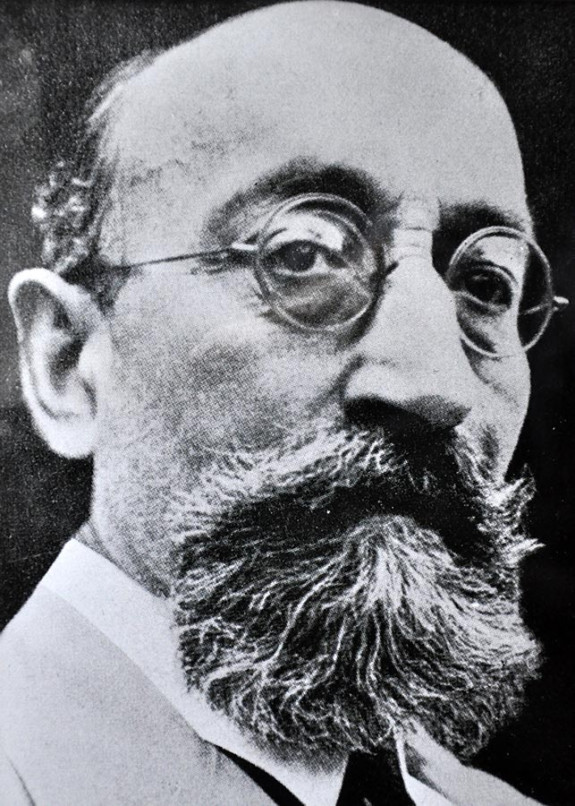Degraded to correction work
Wilhelm Levison
- * 27.5.1876 in Düsseldorf
- ✝ 17.1.1947 in Durham/England
Wilhelm Levison was born in Düsseldorf to the family of Hermann Levison, originally from Siegburg where his Jewish family had lived since the 17th century, and his wife Josephine, née Goldschmidt. He was the first son and his parents named him Wilhelm in honour of the German emperor. Five years later, his brother Arthur was born. Hermann Levison was a merchant and an active member in the „Verein zur Verbreitung und Förderung des Handwerks unter den Juden“ (association for the propagation and advancement of skilled trades amongst the Jews). Wilhelm remembered his father particularly for his generous helpfulness that was by no means restricted to members of the Jewish community. One Christmas, for example, he gave the nuns of a nearby monastery presents for the poor from his own warehouse. After Hermann’s death in 1886, however, his business was liquidated. His widow moved in with her son Wilhelm in 1899 and remained there until her death in 1916.
Directly after finishing high-school, Wilhelm Levison went to Bonn to study classical philology and history, attaining his doctoral degree in 1898. With an article „Zur Geschichte des Frankenkönigs Chlodowech“ (on the history of the Frankish king Clovis I), he gained the attention of Bruno Krusch, chief editor of the MGH series “Scriptores rerum Merovingicarum”. Although Levison originally intended to pursue a career as a librarian, Krusch was able to convince him to take up work for the MGH at the age of 23 in 1899. This was a decision that changed the direction of his life. Levison went on to complete his post-doctoral qualification and take up teaching at the University of Bonn in 1903, while at the same time continuing his exacting edition work for the Monumenta. He carried this double work load until 1920, by which time he had become a leading specialist for early medieval Latin.
In 1917, one year after the death of his mother, Wilhelm Levison married Dr Elsa Freundlich, a Jewish scholar and former student in his university classes. Their marriage remained childless. Bonn was the centre of the Levisons‘ lives until their forced emigration to England in 1939. In 1929, Wilhelm Levison turned down the offer of a professorship in Berlin in order to remain in his familiar climes on the Rhine, where, as he wrote, "he felt himself rooted through his studies and at home with the people and the countryside" (Levison, Familie, p. 65). Receiving an ordinarius professorship in 1920, Levison entered the civil service and was obliged to end his employment at the MGH. He retained his ties to the Monumenta, however, being elected as a member of the central board of directors in 1925 and holding this office for 15 years. In 1935, the NS regime enacted the racist Nuremberg Laws which forbade Prof. Dr Wilhelm Levison as a Jew to continue his official duties. The university of Bonn complied, forcing him into retirement.
After the pogroms against Jews in November 1938, the Levisons decided to emigrate. They moved to Durham in North East England, where Wilhelm Levison was given a stipend as an honorary fellow of the Durham University. There, he continued his work for the MGH until his death in January 1947.
Wilhelm Levison, who was known as a kind and helpful scholar, seldom mentioned his personal situation in his letters, not even in the years after 1933 as life became increasingly precarious. Recalling his long-standing attachment to the MGH in 2010, MGH president Rudolf Schieffer wrote: „It is certain that no-one was ever faced with greater challenges to his „sanctus amor patriae“ (holy love of his fatherland), to cite the old MGH motto, than he, a Rhenish Jew, who never ceased working for this cause, even as he was chased from the country and cut off from every contact to his homeland“ (Schieffer, S. 210).
MGH editions
- Vitae sancti Bonifatii archiepiscopi Moguntini (MGH SS rer. Germ. 57), Hannover / Leipzig 1905
- Gregorii Turonensis Opera. Teil 1: Libri historiarum X (MGH SS rer. Merov. 1), Hannover 1951
- Passiones vitaeque sanctorum aevi Merovingici (III) (MGH SS rer. Merov. 5), Hannover / Leipzig 1910
- Passiones vitaeque sanctorum aevi Merovingici (IV) (MGH SS rer. Merov. 6), Hannover / Leipzig 1913
- Passiones vitaeque sanctorum aevi Merovingici (V) (MGH SS rer. Merov. 7), Hannover / Leipzig 1920
- Translatio Sergii et Bacchi martyrum Weissenburgensis; Translatio sanctorum Geminorum Ellwangensis et Ratisbonensis; Miracula sancti Willibrordi Epternacensia; Translatio trium virginum Coloniensium Walciodorensis, in: MGH SS 30,2 (Leipzig 1934), pp. 1340-1342; pp. 1347-1349; pp.1368-1371; pp. 1372-1384
Other selected publications
- Wilhelm Levison, Die Beurkundung des Civilstandes im Altertum. Ein Beitrag zur Geschichte der Bevölkerungsstatistik, Bonn 1898 - Dissertation
- Wilhelm Levison, Das Werden der Ursula-Legende, in: Bonner Jahrbücher Bd. 132 (1927), S. 1-164
- Wilhelm Levison, England and the Continent in the Eighth Century (The Ford Lectures delivered in the University of Oxford in the Hilary term 1943), Oxford 1946
- Wilhelm Levison, Aus rheinischer und fränkischer Frühzeit. Ausgewählte Aufsätze, Düsseldorf 1948
- Elsa Levison (Hg.), Wilhelm Levison 1876 – 1947, a Bibliography, Oxford 1948
- Wilhelm Wattenbach, Wilhelm Levison, Heinz Löwe, Deutschlands Geschichtsquellen im Mittelalter. Vorzeit und Karolinger, posthum hg. von Walther Holtzmann:
Die Vorzeit von den Anfängen bis zur Herrschaft der Karolinger, bearbeitet von Wilhelm Levison (Heft 1), Weimar 1952
Die Karolinger vom Anfang des 8. Jahrhunderts bis zum Tode Karls des Grossen, bearbeitet von Wilhelm Levison und Heinz Löwe (Heft 2), Weimar 1953
Reference literature on Wilhelm Levison



